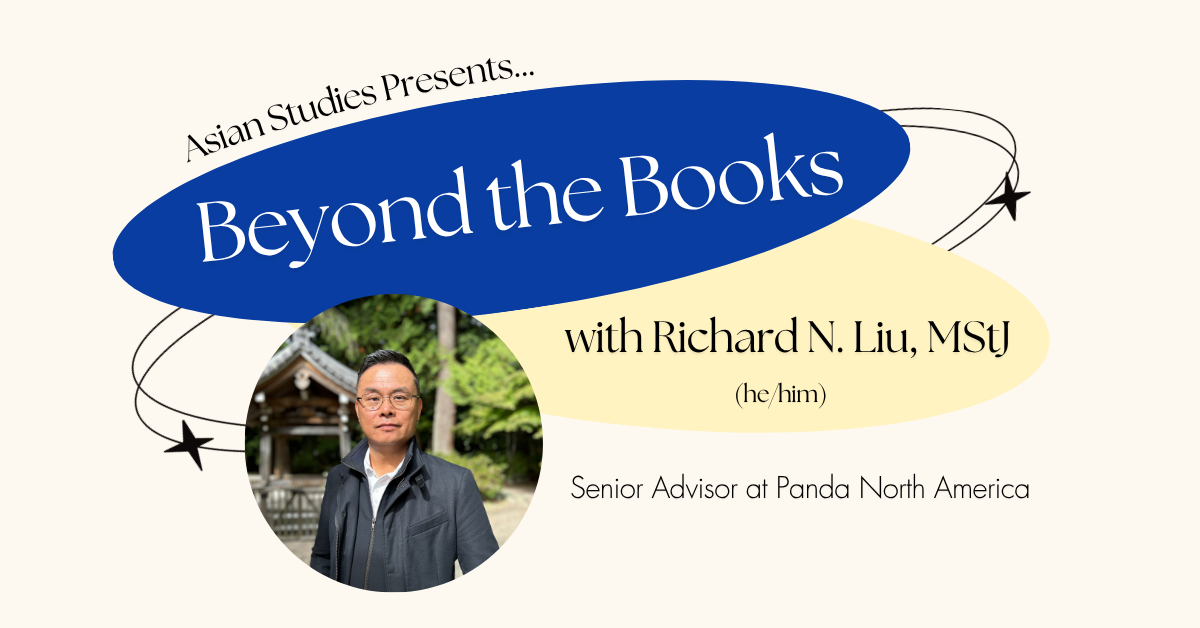Whether you have already locked in an internship, are still cranking out applications, or are hoping to get a peek into the places your Asian Studies degree can take you, you’ve come to the right place! In this year’s Alumni Features series, Beyond the Books, join us in exploring career possibilities and advice from folks who were once in your shoes!
In this installment, we’ll hear from Gabriel, who graduated with a minor in Asian Studies and currently works with the Angel Island Immigration Station Foundation!
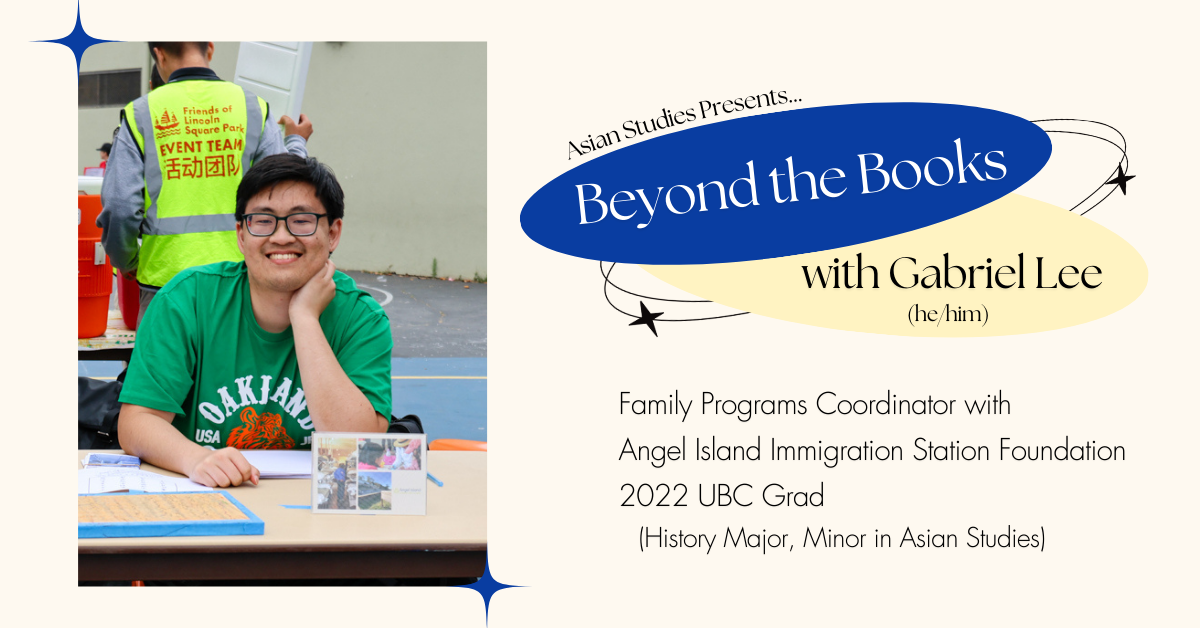

Skip to:
- What did you study at UBC and what do you do now?
- What has been your favourite or most memorable experience with your position so far?
- How has your time with Asian Studies helped you in your career?
- Did you have any worries with your post-grad job search? How did you approach these concerns?
- Are there any lessons you learned during your undergrad that have helped you in the workplace?
- What should an Asian Studies student who is thinking of entering a position like yours consider?
- What’s something you wish you knew or did during your undergrad that would have benefited you post-grad?
What did you study at UBC and what do you do now?
I majored in History and minored in Asian Studies. I focused my degree on East Asia particularly the relationship between China and North America. While doing my undergrad, I was an editor for the Journal of Historical Studies.
I’m the Family Programs Coordinator for the Angel Island Immigration Station Foundation. I handle all things related to youth and family for the foundation such as public events, and our field trip scholarship program.
What has been your favourite or most memorable experience with your position so far?
I received a set of thank you notes from a fourth grade class whose field trip we funded. One of them came from a student who recounted how they had learned in class about how the Chinese Exclusion Act was “racist and not fair to the Chinese” but seeing it in person was really impactful and made the history real.
Later that year I met that same student at a public event we did at their school and they told me how that field trip was the highlight of their year and they had learned a lot. I think about that student often, especially now with the culture of anti-immigrant rhetoric in America. It shows me that the work I’m doing is helping to shape the future for the better.
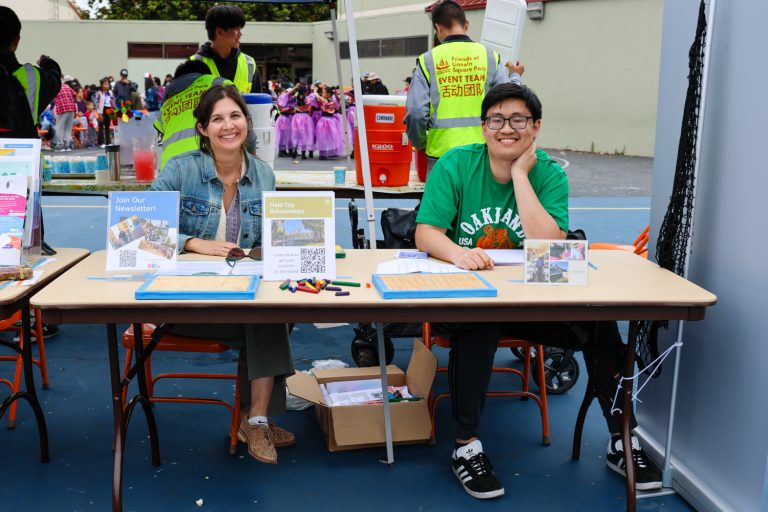

Gabriel boothing with a colleague at a local event.
How has your time with Asian Studies helped you in your career?
Angel Island was a former immigration detention center that primarily existed to exclude Chinese immigrants from the United States. My Asian Studies degree has helped me with language skills and given me a broader cultural context for anti-Asian racism.
I loved all the courses I took with Professor Jessica Main and the way she broke down certain concepts in Asian religions to bite-sized pieces that were easier to understand. The way that she would scaffold her lectures and show her passion is something I try to emulate in my own work!
I’ve also been using Mandarin and Cantonese a fair bit throughout my career. My instructors Pihua Lin and Zoe Lam both helped me get to a point where I won’t lose anyone while I’m giving tours due to language barriers.
(It would also be a disservice not to mention some of the great professors in the Department of History whose courses formed the basis of my Asian Studies minor. Timothy Cheek, Glen Peterson, and Laura Ishiguro were all amazing instructors and mentors!)
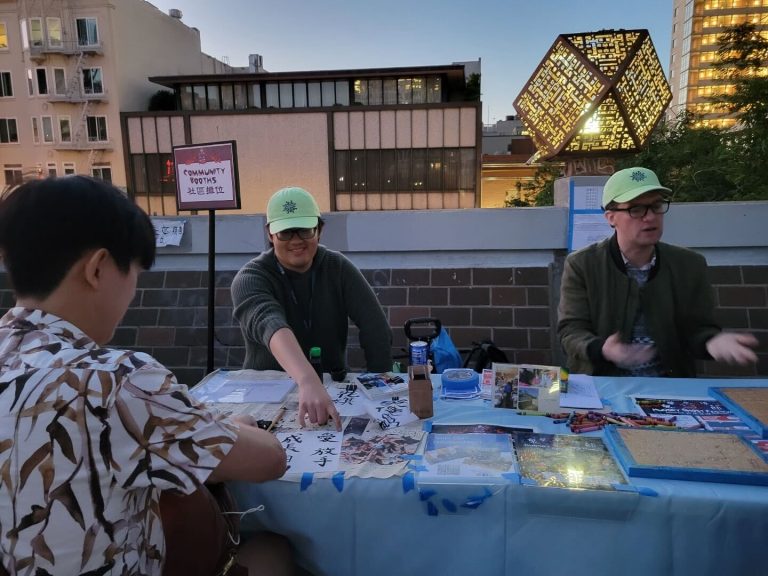

Gabriel leading a community booths calligraphy station.
Did you have any worries with your post-grad job search? How did you approach these concerns?
I submitted a lot of applications. A Lot. Many of them I didn’t hear back from and it definitely made me worry about whether I was doing the right thing. Especially given I didn’t do the groundwork to apply to grad school. What kept me grounded was talking with my mentors and working smaller jobs. It helped me refocus on what I was gaining even when things looked like they were stalling.
While it definitely stung getting ghosted for the umpteenth time I viewed it as a space to refine my resume, my cover letter, or learning how to better market myself. It’s a skill I think many of us have to work on especially if we come from a cultural background based on humility.


Gabriel helping a community member with an activity.
Are there any lessons you learned during your undergrad that have helped you in the workplace?
That the vast majority of people are not good at responding to emails, so a follow up is necessary! In all seriousness though, learning how to cold call/talk/email someone is a skill that has been invaluable in my work.
Scheduling events and ensuring that things go smoothly is entirely predicated on clear and prompt communication. You can’t just wait for people to get around to you sometimes nor can you just assume that opportunities will fall in front of you – you need to be proactive.
What should an Asian Studies student who is thinking of entering a position like yours consider?
Know that museum work is a collection of different jobs stacked up in a trench coat. We’re constantly juggling different responsibilities and while some may find that a positive, sometimes you just want to know exactly what you’re doing that day.
You might also find yourself in a position that requires you to do something you’ve never done before. I’ve learned a wide variety of science demonstrations for my previous jobs that I never did in my undergrad. In this job I’ve learned calligraphy and how to navigate corporate fundraising! None of these things were explicitly written out in my job description but it’s still a part of my role as a staff member.
But I think what’s great about Asian Studies is that just like museum work, there’s so many different topics of study that it gives you so many different ways to apply and use it.
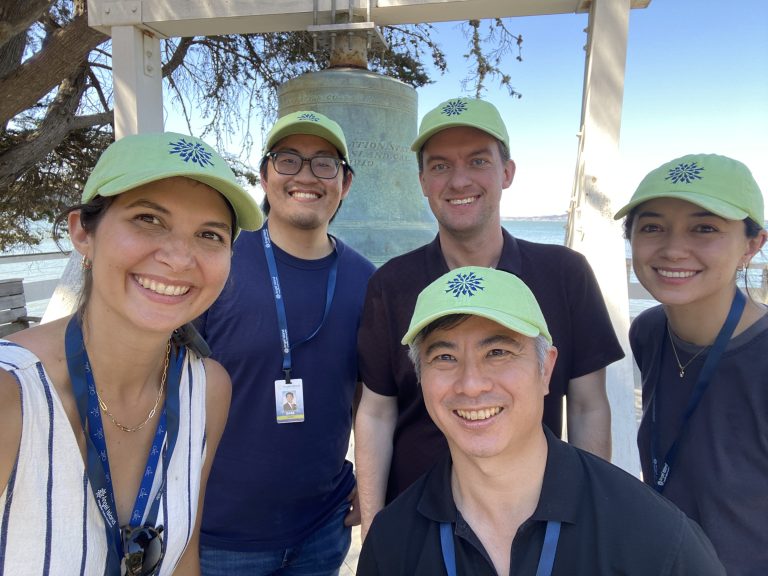

Gabriel pictured with fellow colleagues.
What’s something you wish you knew or did during your undergrad that would have benefited you post-grad?
One – try courses in other departments! Arts is huge and has such an amazing variety of different professors and topics. Take advantage of that.
Two – try to get some work experience. Any kind of work experience is valuable in some way! Especially in a field like mine where you never know what kind of knowledge you might need on a given day.
Enjoyed this article? Read our other Alumni Features!


